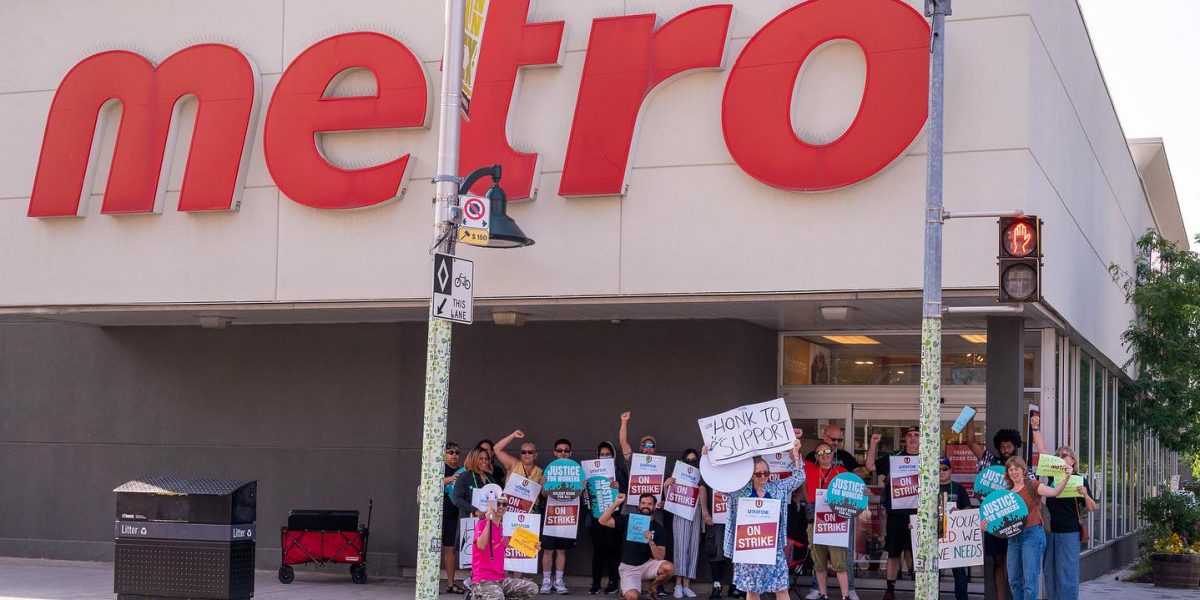On July 29, approximately 3,700 workers at Metro Grocery Stores went on strike, shutting down 27 stores across the Greater Toronto Area. The union representing these workers, Unifor Local 414, reports that the central issues are inadequate wages and lack of benefits for part-time workers, in the face of record profits for Metro. These workers are not only fighting for their own wages but for the rights of all grocery and retail workers in the country.
Workers taking on greedy grocery chains
It’s no secret that all the major grocery stores have reaped enormous profits since the pandemic: all three major grocery chains, Loblaws, Sobeys and Metro, have seen record profits. At the same time, food prices increased 11% in one year. Throw in fat bonuses for executives, including $13.2 million for just 5 Metro executives in 2022, and it’s no wonder these corporations are being accused of “greedflation.”
These profits would not have been possible without the thousands of employees who kept grocery stores running through the pandemic and continue to do so. These profits are generated by store employees, which gives workers an immense amount of power when organized and united.
The pandemic showed the true value of grocery store workers. Yet the extra $2/hour of “hero pay,” that workers received when the pandemic started in March 2020 was canceled after about two months at Metro, Sobeys, and Loblaws, despite government shutdowns persisting for another two years. Workers at all major grocery chains have been calling for the reinstatement of pandemic pay ever since it was revoked, to no avail.
Part-time work has also become central to this strike. Unifor National President, Lana Payne, explains that full-time jobs at grocery stores used to be stable sources of income to support families.
Now, part-time work has eroded these jobs and forced workers to accept precarious conditions with no benefits and allowed companies to grant as few benefits as possible by employing more part-time than full-time workers. At Metro, 70 percent of workers are part-time. That means that 70 percent of the corporation’s employees don’t have sick days or other benefits granted to full-time employees.
Additionally, the cost of living has pushed many Metro workers into financial despair. Many cite being unable to afford to shop at Metro and struggling to support families on their current incomes.
Workers reject tentative agreement
The strike began after workers rejected a tentative agreement.
Metro spokesperson Marie-Claude Bacon stated that the agreement involved a four-year plan to increase wages above inflation, and was “mutually satisfactory” and “unanimously recommended” to employees the week before the strike began.
As mutually satisfactory as it may have seemed to the company, workers did not agree. While Unifor recommended workers ratify the agreement, the workers themselves decided that it was not enough given the enormous profits that all three major grocery chains have made on the backs of workers.
Metro workers striking for all retail and grocery workers
The issues that Metro workers are striking for are not confined to Metro alone. The same issues exist in Canada’s other two grocery giants, Loblaws and Sobeys. It is not a coincidence that all three corporations revoked pandemic pay at the same time. When one of these companies decides to disrespect their employees, the other two follow suit.
The same could be true for workers. Metro workers are not just fighting for decent wages for themselves but to raise the standard across the industry.
Did you like this article? Help us produce more like it by donating $1, $2, or $5. Donate

